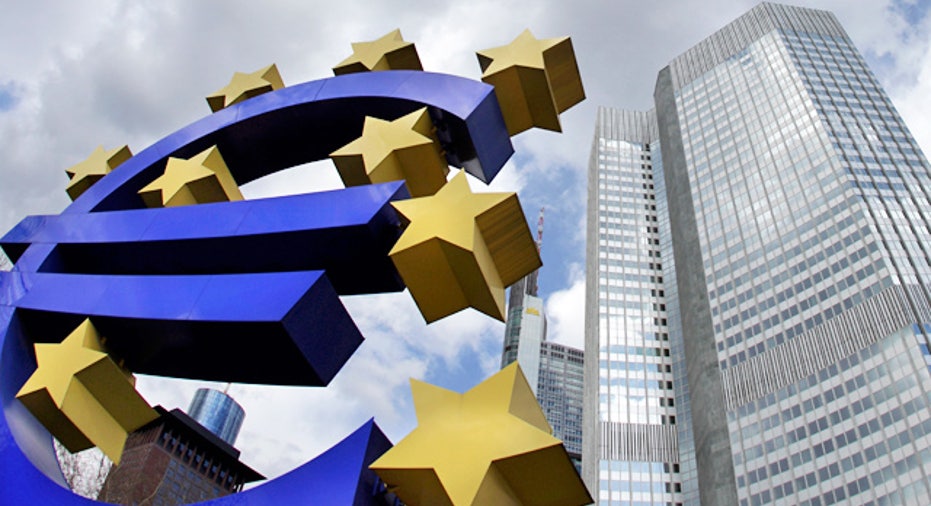ECB Leaves Benchmark Interest Rate Unchanged

The European Central Bank left interest rates unchanged on Thursday, shifting focus to an asset-buying plan with which it hopes to revive the flagging euro zone economy and see off the specter of deflation.
After cutting rates last month to what ECB President Mario Draghi said was "the lower bound," the ECB left its main refinancing rate at 0.05 percent. It held its deposit rate at -0.20 percent, which means banks pay to park funds at the central bank overnight.
"No change but the focus for this meeting is not on interest rates but on the purchase programs," said Nomura economist Nick Matthews. "Markets will be looking for all the details, particularly the minimum ratings for covered bonds and ABS."
Several hundred protesters held a demonstration outside the Capodimonte palace in the southern Italian city of Naples where the ECB Governing Council was due to meet.
Television pictures showed police in riot gear facing off against a crowd of protesters, preventing their entry into the grounds of the 18th century former royal palace, where ECB Draghi will hold a news conference after the meeting.
Demonstrators chanted slogans and marched behind a large banner reading "Job insecurity, poverty, unemployment, speculation. Free us from the ECB!" and speakers attacked spending cuts, job losses and austerity policies they said were imposed by Brussels.
Draghi has called on governments to do their part to boost confidence by implementing structural reforms.
For its part, the ECB announced in June that it planned to start buying asset-backed securities (ABS) - bundled loans - and covered bonds, another form of secured debt, later in the year. It hopes the program will spur the market for such credit and support lending to the small and medium-sized firms that form the backbone of the euro zone economy.
But for the plan to apply across the bloc, the central bank may need to buy ABS of a lower standard than it usually requires as collateral from those tapping its funding operations.
That prospect has already stirred controversy in Germany and elsewhere. But the economic outlook has convinced a majority of the ECB's 24 Governing Council members they need to act.
Draghi is expected to flesh out the asset-buying plan later.
A Reuters poll on Monday showed money market traders on average expect the ECB to buy a total of 200 billion euros of ABS and covered bonds over a year.
ABS CONTROVERSY
After disappointing initial take-up of a new 400 billon euro round of cheap ECB loans to banks, Frankfurt's efforts to restart the ABS market have come into sharper focus.
Asset-backed securities are put together by banks pooling loans made to companies or consumers to buy homes and cars, or lending via credit cards. They are then sold on to investors, including other banks, insurers and pension funds.
Draghi has appealed to governments to back the purchase plan with guarantees for some riskier ABS tranches, a step that would add a seal of security to the market and encourage other buyers.
But France and Germany have opposed such state guarantees, which may frustrate the ECB's efforts to grow the small market.
The program could see the ECB buy 'junk'-rated Greek and Cypriot bank loans, people familiar with the bank's thinking have said. Such a step may increase the tensions between Germany and the bank.
Bundesbank chief Jens Weidmann has already opposed the ABS purchase plan.
STIMULUS SIGNALS
The asset purchase initiative will help fulfill Draghi's aim, declared at last month's meeting, of pumping money into the economy by expanding the ECB's balance sheet "towards the dimensions it used to have at the beginning of 2012."
The ECB's balance sheet topped 3 trillion euros in March 2012, but at times in the first quarter of that year it was some 400 billion euros lower, a gap that leaves uncertainty as to exactly how much stimulus the ECB wants to deploy.
To impress markets, Draghi could make a binding commitment to expand the balance sheet to a more specific level, though that is unlikely.
But the ECB president will need to signal the bank is ready to do more to sustain a fall in the euro to near two-year lows that could help lift inflation off rock-bottom levels.
A Reuters poll of analysts showed the euro will weaken further over the coming year, with the possibility of further ECB stimulus dragging down the currency.



















